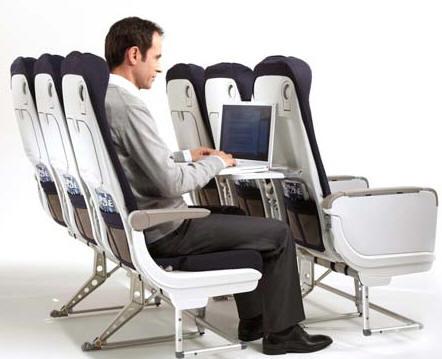
NEWSROOM
 |
NEWSROOM |
<
|
|
|
|
|||
|
By Mike Mitchell |
||||
 |
January 21, 2010 -
A number of British tabloids over the week had reported in the news
media that the French air carrier, Air France, requires its overweight
passengers to pay for a second seat onboard their aircraft. If the
passenger did not pay for the extra seat he or she would then be
prevented from boarding for 'safety reasons'. Opposed to the information
disclosed in the press, Air
However, Air
Since 2005, Air |
|||
|
It is still unclear as to Air
A typical U.S. air carrier “Overweight Passenger Policy” today requires
the passenger to pay for a second seat if he or she unable to fit into a
single seat in the ticketed cabin, unable to properly buckle the
seatbelt using a single seatbelt extender; and or is unable to put the
seat's armrests down when seated unless there is a empty seat next to
the passenger. If no unused seats are available on the ticketed flight, then the customer must either purchase an upgrade to a cabin with available seats that address the above-listed scenarios, or change his or her ticket to the next available flight and purchase a second seat in addition to the one already purchased. If a customer meeting any of the above-listed criteria cannot be accommodated next to an empty seat and chooses not to upgrade or change flights and purchase a ticket for an additional seat, he or she will not be permitted to board the flight. |
||||
|
If an additional
seat is purchased, the fare for that seat will be the same as the fare
paid for the original seat, regardless of whether the additional ticket
is purchased along with the original ticket or separately. This applies
even if the additional ticket is purchased on the day of departure, when
fares are normally higher. Passengers who wish to purchase an extra seat
are strongly encouraged to contact their airline via phone to ensure
that the passenger receives two adjacent seats at the same fare.
Passengers are
encouraged to check-in with a customer service agent at the airport,
rather than online or at an airport kiosk. This will ensure that both
seats are checked in properly and that two adjacent seats have been
assigned.
Baggage fees and
allowances; checked baggage policies usually apply per seat, so any
checked baggage allowances will be multiplied by the number of tickets
purchased. Baggage fees can also be distributed among the ticketed
seats. For example, instead of paying first and second bag fees for two
checked bags, a customer with two ticketed seats could instead pay two
first bag fees.
One thing is
clear, the onboard seating area on most aircraft is uncomfortable. Each
seat is defined by two armrests that is barely sufficient to provide a
tolerabe comfort level. The seats are confining, cramped and do not
offer enough legroom. The standard seating configuration was not
designed nor built to suite the average passenger never mind the
overweight or the obese traveler. Airlines must change the onboard
seating area to offer a great comfort level and accommodate all. All paying airline passengers are entitled to comfortable seating and airlines should not be in the business of discriminating because of weight in order to squeeze every passenger on a flight. Over 70 percent of passenger complaints are from passengers who complained that the overweight passenger sitting next to them took up some of their passenger seating area. This is easy, set aside two rows of seats to accommodate those who are overweight. |
| ©AvStop Online Magazine Contact Us Return To News |
|